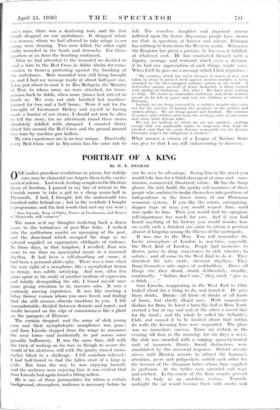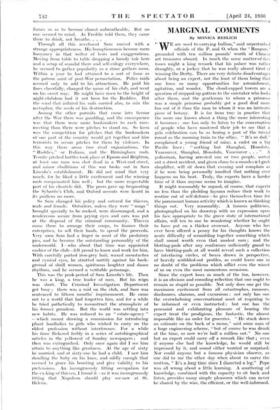PORTRAIT OF A KING
By H. E. DEGRAS
ONE makes grandiose resolutions in prison, but indulg- ence may be claimed if one forgets them in the excite- inent of release. Last week, feeding scruples to the libertine flame of freedom, I paused in my line of retreat to the Cornish moors to take a girl to a cheap music-hall in Plymouth. I had, I thought, left the underworld two hundred miles behind me ; but in the vestibule I bought a programme, and the first words that met my eye were : "Sam Lincoln, King of Clubs, Prince of Craeksmen, and Knave of Diamonds, will compeer."
The name sent my thoughts rocketing back a dozen years to the turbulence of post-War Soho. I walked into the auditorium amidst an upsurging of the past, and the Jazz-band which occupied the stage as we entered supplied an appropriate obbligato of violence. In those days, in that kingdom, I recalled, Jazz was more to me than an apocryphal music or a rammish rhythm. It had been a self-absorbing art—more, it had been a personal philoxnphy. There was a time when the very sight of a saxophone, like a nympholept frozen in frenzy, was subtly satisfying. And now, after five years spent in 111e study of another medium of expression and totally disregarding the old, I found myself once more giving attention to its staccato sobs. It was a curiously moving experience. It was like meeting a fubsy frowsy woman whom you once loved, and finding that she still arouses obscure emotions in you. I felt uncomfortable, divided between distaste and regret, and doubt hovered on the edge of consciousness like a ghost on the parapets of Elsinore.
The curtain dropped, and the array of slick young men and their nympholeptic saxophones was gone ; and Sam Lincoln stepped from the wings to announce the next turns—and incidentally to put across some passable buffoonery. It was the same Sam, still with the trick of rocking on his toes as though to assure the world of his alertness, still with the jaunty waxed mous- taches tilted to a challenge. I felt somehow relieved ; I had half-feared to find the fallen crest of a king in exile. But from the way he was enjoying himself, and the audience were enjoying him, it was evident that Sam Lincoln had again found a fitting milieu.
He is one of those personalities for whom a certain background, atmosphere, audience is necessary before he can be seen to advantage. Seeing him in the street you would take him for a third-class agent of sonic sort—com- mission, commercial, theatrical, estate. He has the sharp glance, the wiry build, the pawky self-assurance of those people who contrive to wedge themselves into positions of independence in the lower strata of our Plutonian economic system. If you like the astute, enterprising, dapper type of man, you would respect Sam—until you spoke to him. Then you would find his egregious self-importance too much for you. And if you had heard anything of his history you would wonder how on earth such a flatulent ass came to attain a position almost of kingship among the thieves of the metropolis.
It was due to the War. You will remember the hectic atmosphere of London in war-time, especially the West End of Londan. People had memories to drown, pains to drug, consciences to still, edacities to satiate ; and all came to the West End to do it. They distorted life into crude, aberrant rhythms. They flung themselves into orgies of sculduddery. Above all things else they drank—drank deliberately, steadily, continually. " Sailors don't care," they cried, " give us a drink. . . ."
Sam Lincoln, reappearing in the West End in 1918, looked about for a thing to do, and found it. He gave them drinks. Drinks—all kinds of drinks at all kinds of hours, but chiefly illegal ones. With magnificent. disdain for Dora, he hired a barn-like hall in Ham Yard, erected a bar at one end and at the other a raised dais for the band ; and the whole he called the Sybarite's Club, and caused it to be bruited about that within its walls the licensing laws were suspended. The place was an immediate success. From six o'clock in the evening till four in the morning, for six days a wcek, the club was crowded with a surging, quasi-hysterical mob of incarnate thirsts. Social distinctions were annihilated by the universal response. Oxford accents strove with Hoxton accents to attract the barman's attention, peers and pickpockets outbid each other for the favours of the clinquant ladies whom Sam supplied in profusion. At the tables men sprawled and wept and retched. In the centre of the floor couples pressed body to body in an undulous ecstasy. Towards midnight the air would become thick with smoke and fumes so as to become almost unbreatheable. But no one seemed to mind. As Freddie told them, they came there to drink, not breathe. . . .
Through all this revelment Sam moved with a strange appropriateness. His bumptiousness became mere buoyancy in that welter of lusts and exaggerations. Moving from table to table dropping a bawdy tale here and a scrap of scandal there and self-eulogy everywhere, 'he seemed to gather popularity as a stone gathers moss. Within a year he had attained to a sort of fame as the patron saint of post-War pernoctation. Police raids seemed only to add to his attractions. He paid his fines cheerfully, changed the name of his club, and went on his sweet way. He might have risen to the height of night-clubdom had it not been for the Raddies. But the wind that inflated his sails carried also, to mix the metaphor, the seeds of his destruction.
Among the other pursuits that came into favour after the War there was gambling, and the consequence was that there were more bookmakers to each race- meeting than there were pitches to stand on. So keen was the competition for pitches that the bookmakers of one part of the country would get together and hire terrorists to secure pitches for them by violence. In this way there arose two rival organisations, the " Raddies," or Italians, and the Birmingham mob. Terrific pitched battles took place at Epsom and Brighton, at least one man was shot dead in a West-end street, and minor ebullitions of this war broke out in Sam Lincoln's establishment. He did not mind that very much, for he liked a little excitement and the winning mob compensated him well ; but the more respectable part of his clientele did. The peers gave up frequenting the Sybarite's Club, and Oxford accents were heard in its purlieus no more.
So Sam changed his policy and catered for thieves, male and female. Outsiders, unless they were " mugs " brought specially to be rooked, were discouraged, and a rendezvous secure from prying eyes and ears was put at the disposal of the criminal community. Thieves came there to arrange their coups, to finance their enterprises, to sell their hauls, to spend the proceeds. Very soon Sam had a finger in most of the predatory pies, and he became the outstanding personality of the. underworld. I—who about that time was appointed cashier of the club—felt proud to know and work for him. With carefully parted iron-grey hair, waxed moustaches and cynical eyes, he strutted nattily against his back- ground of shrill women, spirituous laughter and dance rhythms, and he seemed a veritable personage.
This was the peak-period of Sam Lincoln's life. Then he was a king, a true leader of men. But his reign. was short. The Criminal Investigation Department got busy ; there was a raid on the club, and Sam was - sentenced to fifteen .months' imprisonment. He came out to a world that had forgotten him, and for a while he tried pathetically to reconstruct the atmosphere of his former grandeur. But the world was settling into new habits. He was reduced to an " estate-agency " —which meant drawing a commission for introducing pliant landladies to girls who wished to carry on the oldest profession without interference. For a while his fame flickered feebly in a series of autobiographical articles in the yellowest of Sunday newspapers ; and then was extinguished. Only once again did I see him attain to anything like greatness. At the age of sixty be married, and at sixty-one he had a child. I saw him dandling the baby on his knee, and oddly enough that seemed to grace his boasting and give validity to his pretensions. An incongruously fitting occupation for the ex-king of thieves, I found it—as it was incongruously fitting that Napoleon should play see-saw at St. Helena.



















































 Previous page
Previous page